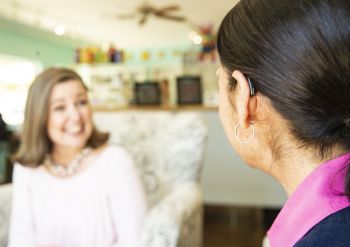So you’ve received the hearing aids your hearing health professional prescribed for you—and you hate them. What now? Should you leave them in your nightstand and decide to live with hearing loss?

weeks, or even months, to get used to wearing
hearing aids, and then soon find them invaluable.
Absolutely not!
It's important to wear your hearing aids consistently to get the most benefit and to reduce the negative consequences of untreated hearing loss. At the same time, it's important to feel satisfied with your treatment. The good news is, there are steps you can take to stop hating your hearing aids and even learn to love them.
Why people don't like their hearing aids
While everyone is unique, Martin Case, a hearing instrument specialist and founder of Fountain Hills Hearing Health in Fountain Hills, Ariz., said there are three primary reasons why people aren’t satisfied with their hearing aids:
- The hearing aids aren’t comfortable
- They don’t help the person hear any better
- The person doesn’t know how to operate them
The good news is that all these can be addressed, especially when you’re working with an experienced hearing healthcare professional.
How to love your hearing aids
1. Be patient
Compared to eyeglasses, hearing aids take time to get used to, as your brain relearns sounds it's forgotten about. You also have to get used to the sensation of something in your ears.
Start slow but be consistent in your use, and know that it's normal for there to be an adjustment phase.
2. Make sure your own voice sounds right
If your voice with hearing aids sounds different than you expected—tinny, for example—talk to your provider. They might be able to make some adjustments to your devices to help your voice sound more natural.
3. Make sure hearing aids fit comfortably in your ears
Although hearing aids typically take time to get used to, they shouldn’t be painful to wear. If they are uncomfortable or the amplification is too loud, ask for an adjustment from your hearing center.
4. Know how to insert your devices
If you’re having trouble putting your hearing aids in your ears, ask for help. Like most new things, there’s a learning curve—and practice makes perfect.
5. Change your perspective
Sometimes, dissatisfaction with your hearing devices can stem from being reluctant to get them in the first place. If that's the case, it can be helpful to shift your perspective.
Instead of focusing on what you don't like, remind yourself of the good aspects. For example, that hearing aids provide important health benefits beyond helping you hear better, or that they make it easier for you to stay connected to your loved ones.
6. Communicate with your hearing health provider
Not only can hearing health professionals determine how well you are hearing and help you identify the best hearing aid to treat your specific hearing loss, but they can also provide follow-up care to make sure your devices fit well and work as prescribed.
If you have hearing aids but aren’t wearing them, have an honest conversation with your hearing healthcare professional about what's bothering you.
“Good care from a caring provider makes all the difference,” Case said. “I’ve found if patients have really good technology and follow-up care, it can help the patient help themselves.”
“Good care from a caring provider makes all the difference."

Consider auditory rehabilitation
If you haven’t been hearing well for awhile, chances are you’re going to need some type of aural rehabilitation in addition to hearing aids.
Just as muscles atrophy when they haven’t been used in awhile, so too does our auditory system. It needs “exercising” to regain what it’s been missing.
Many hearing healthcare professionals include some aspects of aural rehabilitation with their care. At Fountain Hills Hearing Health, Case conducts a communication assessment before the hearing evaluation to make sure that the technology he prescribes will perform to expectations. He also schedules follow-up appointments to determine if there are areas for improvement.
Most aural rehabilitation programs include a hearing loss management program that may provide the following:
- Behavioral steps that incorporate relaxation and well-being into daily activities
- Technological steps to determine what other technology, such as assistive listening devices, might be beneficial
- Preventive steps to identify difficult hearing environments and strategies to avoid them
- Restorative steps to create a plan for dealing with challenging or uncomfortable listening environments
- Educational steps for identifying online resources and auditory training programs to do at home
- Coaching with professionals, such as auditory training specialists or speech/language pathologists
Prioritize your hearing health
Whether you've been struggling to adapt to your hearing aids or have been putting off addressing your hearing concerns, it's important to make your hearing health a priority. The right provider can help find a treatment option that meets your individual needs and brings joy to your life.
“Don’t give up. That’s the main thing,” Case said. “There is help and hope for a better life.”
For help in finding a qualified professional in your community, visit our directory of hearing healthcare professionals and hearing centers.
More: Hearing aid users share the surprising sounds they can now hear
The above is the interpretation of From Hating to Loving Your Hearing Aids: A Guide provided by Chinese hearing aid supplier Shenrui Medical. Link https://www.srmcm.com/Blog/From_Hating_to_Loving_Your_Hearing_Aids_A_Guide.html of this article is welcome to share and forward. For more hearing aid related information, please visit Blog or take a look at our Hearing aids products















